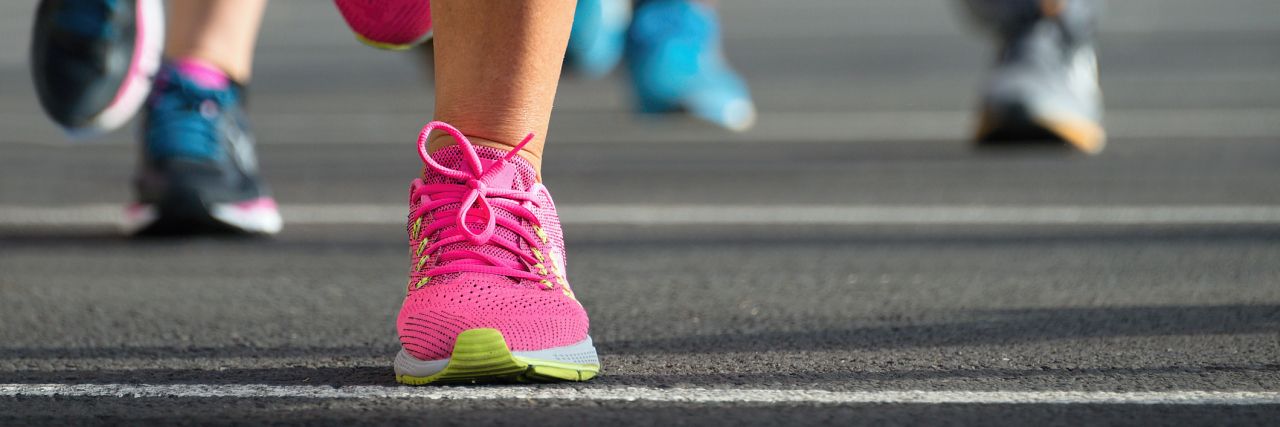When a runner runs a 100-yard dash, they sprint as fast they can to the end of their race, hoping to break through the red tape at the finish line, signaling to themselves and everyone else that they were the fastest and won the race. After the sprinters cross the finish line, many collapse to the ground in a heap from the thrill of victory, exhaustion, or both.
• What is Bipolar disorder?
The runners run at their fastest and top speed for 30 seconds or more until the depletion stores in their muscles, bodies and mind are gone. They have nothing left. They crash for a period and need to rest until their bodies can be restored to the natural state they were at before their race.
The Boston Marathon is a 26.2 mile endurance test. Most bodies are not accustomed to running for over two hours in a race like that. A marathon usually puts your body through the wringer, draining your body of almost everything — it can even compromise your immune system. During the race, sometimes things can cause a runner to have psychological symptoms like confusion or disorientation. After the race, the runners may experience muscle soreness for over a week. A marathon affects your body and your mind. The runners need to recover and repair with proper nutrition and lots of rest and sleep.
This is what can happen inside and within the body of a person who struggles with bipolar disorder when the brain is cycling between the two extreme mood poles of mania and depression. My bipolar cycles from being hypomanic to depression, with varying degrees and durations of both. Sometimes my hypomanic episodes will last a long time, and my brain and mood continue to fly and soar higher and faster until I crash into a severe depression.
When I am hypomanic, my brain moves very quickly, sprinting from one thought, idea or activity to the next. I require less sleep, and sometimes I can’t sleep at all.
My happiness increases, sometimes reaching euphoria. My creativity increases and I excel and accomplish many things beyond what an “average” person can do. I seem to achieve everything at my ultimate ability level, being the best me I can be. My creative juices flow beyond most. I am the most likable me, and I feel like I am a good person during a hypomanic episode.
During my hypomania, life isn’t different, but my brain is. Everything is better and brighter and more beautiful and easier. Life, everyone and everything in life, me included, are exquisitely and fabulously beautiful. But then the sprint and marathon race inside my brain finishes. My brain becomes completely exhausted — depleted of everything it had.
My brain was on fire. It did too much. It sprinted and moved too fast for too long until it used up all the reserves and had nothing left. It exceeded its limits and what it should and could do. My brain needed to rest, so it stopped working. My brain stopped. It quit functioning at a normal capacity, causing me to feel like I have died — unable to function and perform my life.
While my brain is resting from my hypomanic sprint and marathon, the rest of me feels dead. Like the sprinter and marathon runner, my brain needs to rest. It stops as if it is taking a nap.
I must listen to my brain because I can’t do anything else. My brain causes my mind and body to stop, unable to function any longer. I must recover from my hypomanic race, so I crash and collapse at the finish line of my race — and depression sets in.
Depression is like a rest after the race, except it doesn’t feel like a nice, relaxing, peaceful rest. When my brain crashes, the severe depression hits with a knockout force. My brain stops working, causing my mind and body to feel sick and void of life. I feel like I have died and sometimes I have suicidal thoughts.
The visceral pain of despair, emptiness, inner death of nothingness, void of feelings, darkness and emptiness from depression has set in. I have nothing left. I may have won the hypomanic race/marathon, but now I need to rest my brain and body and recover. The race is over and I am done. I have collapsed at the finish line of my life.
I am finally recovering from the severe depression I have been in after my high-flying hypomanic mood crashed. Now that I feel a bit better, it seems to make more sense to me. My brain crashed after the race. My brain collapsed at the finish line. I broke through the red tape at the finish line of my hypomanic race.
I must do all I can to survive the feeling of my brains collapse from exhaustion caused by sprinting too fast and too long. I need to rest and take better care of myself. Actually, making sure I take care of myself and getting enough rest and sleep is sometimes the best medicine for me. Last night, after difficulties sleeping, I finally slept. I even took a nice nap today. I believe being able to finally sleep and rest has helped me feel better after my hypomanic sprint/marathon.
If you or someone you know needs help, visit our suicide prevention resources page.
If you need support right now, call the National Suicide Prevention Lifeline at 1-800-273-8255, the Trevor Project at 1-866-488-7386 or text “HOME” to 741-741. Head here for a list of crisis centers around the world.
Thinkstock photo via Pavel1964

